As announced in his State of the Union Address, it seems that one of Obama’s major goals for his term is raising the minimum wage to $9.50. At face value, this idea seems like a good idea to help get the poor more money. However, I question this assumption.
In reality, it seems like a bad idea that will just lead to fewer jobs, a rise in prices, along with harming employees as a whole. It is simple: If minimum wage is raised, the profits of a corporation do not suddenly increase. Therefore, their ability to pay does not increase.
Imagine that a corporation has $20 to pay all its employees. Now with that $20 a corporation pays four employees $5. Then minimum wage goes up, now a corporation still has $20 but can only hire two employees. This means that, yes, the purchasing power of two individuals may have gone up, but the power of two individuals has gone to zero. This means the economy has not benefited because there are not more jobs. In fact, there is actually a decrease.
Beyond job losses, raising the minimum wage will just lead to an increase in prices for the consumer. In order for the corporations to keep the essential workers they need to increase the amount of money they get since they will not take a cut in profits.The corporations will need to increase substantially in order to keep the same profits, and everyone knows that the investors will be willing to cut profits, but they will gladly increase prices.
To continue the analogy from before, the same corporation has $20 to spend on labor and they sell a product for $5. This covers all of their costs and gives profits. This corporation needs to have four employees in order to function; however, because the minimum wage was raised and they only have $20 to spend on labor, they need to increase the product cost to $7 in order to offset the increased cost. This means the consumers will have less money to spend on all of the products they want to buy.
Finally, raising the minimum wage harms workers. Employees who make minimum wage at most stores tend to be the less experienced workers than the ones who make more money. However, if minimum wage is increased, the less experienced workers will be making the same as the more experienced workers, as the corporation cannot afford to pay the more experienced employees more.
Different people do different amounts of work and as such, they deserve to get paid more. If the same corporation still has $20 to spend, it decides to hire three employees. The corporation has to have three employees, so it pays one $10 because this employee does more work and has more experience than the other two, who get paid $5.
If minimum wage goes up then all three employees are now making the same since the corporation cannot afford to pay the employees more. Thus, the employee with the most experience gets harmed because they are now making the same as employees with less experience.
Increasing the minimum wage is bad for workers, the economy and consumers. Corporations need to make money in order for the market to survive. In order to protect the market, we need to protect the current minimum wage level.
Regan Williams is a junior majoring in political science and communication studies. His column runs biweekly.






